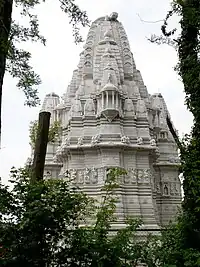Jainism in Europe
The credit for introducing Jainism to the West goes to a German scholar, Hermann Jacobi, who translated some Jain literature and published it in the series 'Sacred Books of East' in 1884.[1] In Europe, the largest Jain populations are in Britain, with a population of about 25,000 (as of 2006).[2]
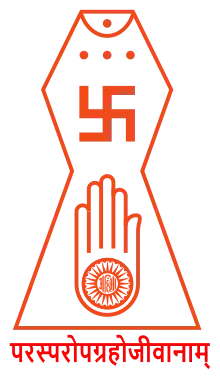
| Part of a series on |
| Jainism |
|---|
 |
Jains living outside India belong to various traditions: Digambara, Shvetambara, Terapanthi, Sthanakvasi, Shrimad Rajchandra are all represented.[3] In many cases, they gather and worship together in spite of sectarian differences.
Jainism in Ireland
The Jain community in Ireland is involved across different occupations. The Jains in Ireland are estimated to be around 1000 people. The majority live in and around Dublin but a few families are spread across other parts of Ireland, including Northern Ireland. Jains in Ireland are a well settled and respected community. Jain Samaj Ireland includes members of all different panths within Jainism.
Jain Samaj Ireland aspires to build a Jain Temple in Ireland and is actively seeking support and guidance from various other Samaj in India and across the world.
Jainism in Germany
There are no Jain temples in Germany. However, there are a few people living in Germany who practice Jainism. To support and practice Jainism, there are a few organizations or associations.
Jainism in Belgium
The Jain community in Europe, especially in Belgium, is mostly involved in the diamond business.[4]
The Gujarati Jains in Belgium are estimated to be around 1500 people. The majority live in Antwerp, working in the wholesale diamond business. Belgian Indian Gujarati Jains control two-thirds of the rough diamonds trade and supplied India with roughly 36% of their rough diamonds.[5] A major temple, with a cultural centre, has been built in Antwerp (Wilrijk), the diamond capital.[6] Their spiritual leader is a full-fledged member of the Belgian Council of Religious Leaders, which he joined on 17 December 2009.[7]
Jainism in Poland
The Jain community in Poland is involved across different occupations and Jains in Poland to estimate below 200 people, where majority of people are scattered around Warsaw, Krakow and few other cities. As on March 25th, 2023 establishment of the statute of Shri 1008 Mahavir Swami (Digambar) was successfully completed by Jain Community of Poland in “Hindu Bhavan Temple” / "Świątynia Hindu Bhavan" in Warsaw, Poland and marked as second temple in Europe after Antwerp, Belgium where devotees can offer there prayers daily. Jain Samaj Poland includes members of all different paths with Jainism.
Jainism in the United Kingdom
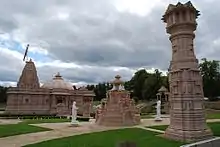

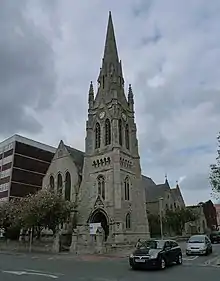
As of 2016, there are around 35,000 Jains in the United Kingdom.[8]
One of the first Jain settlers, Champat Rai Jain, was in England during 1892–1897 to study law. He established the Rishabh Jain Lending Library in 1930. Later, he translated several Jain texts into English.[9]
Leicester houses one of the world's few Jain temples outside of India.[10] There is an Institute of Jainology at Greenford, London.[11]
The last decade has seen the growth of the Jain community in Greater London. Currently the Jain Network have a derasar in Colindale and The Mahavir Foundation has a temple at Kenton Road, Kenton. It has consecrated images of Shri Mahavir Swami, Shri Parshvanath, Aadinathji, Shri Simandhar Swami and Shri Munisuvrata Swami. It also has Shri Gautam Swami and Padmavati Mata. There is a separate shrine of Manibhadra Veer, Ghantakarna Mahavir and Nakoda Bhairavji.
Shrimad Rajchandra Mission Dharampur also have UK centres in Leicester, London and Manchester.[12]
Timeline
- 1847: Vegetarian Society established in UK.
- 1873: Hermann Jacobi encounters Jain texts in London. He later visited India to further study and translate some of them.
- 1891-1901: M.K. Gandhi in London corresponds with Shrimad Rajchandra regarding questions raised by missionaries.
- 1893 : Virchand Gandhi captivates western world with his participation in First ever World religion Parliament at Chicago. And thereafter had huge fan followings from US and Europe.
- 1892: Champat Rai Jain (C.R. Jain) in England during 1892–1897, to study law. He established a Jain library. Later he translated several Jain texts into English.[13]
- 1906-1910: Jugmandar Lal Jaini (J.L. Jaini) at Oxford as a law student.
- 1909: J. L. Jaini created the Jain Literature Society in London together with F. W. Thomas and H. Warren.[14]
- Hemchandra's "Yogaśāstra" was first translated into Japanese in the 1920s![15]
- 1930: the Rishabh Jain Lending Library was established by Champat Rai Jain.
- Tattvartha Sutra and the Dashavaikalika Sutra were translated in the 1940s.[15]
- 1949: The World Jaina Mission, founded in London, by M. McKay, W. H. Talbot, F. Mansell, and Mrs. K. P. Jain.
- Forty Japanese students were sponsored by the Government of India in the early 1950s to live and study in India – some of them studied Navinaya in Varanasi and Gujarat, which led to new interest in the study of Jainism in Japan; one of the accomplishments was the first Japanese book by Minakata Kumagusu to simplify and translate the concepts of Jainism into Japanese for use by the common people in Japan.[15]
- 1971: Idi Amin expelled Indians from Uganda. Jains from Eastern Africa started migrating to UK.
- 1973: Jain Samaj Leicester was formed.[16]
- 1979: An old church building in Oxford Street, in heart of Leicester was bought and named the Jain Centre.
- 1980: The Jain Samaj was expanded as a European body.
- 1980: First Digamber Temple outside India established in Kenya.[17]
- In the early 1980s, the Jain Society of Toronto was founded and the first Jain Center was established in that city[18]
- 1982: Jain Samaj opened an office in London, The All India (Overseas) Jinalaya Samiti, was created to complete the temple according to the plans drawn by the architects from Leicester, Bombay and Ahmedabad.
- 1983: On 10 November, Shilanyas ceremony the laying of the foundation stones for the first fully consecrated Jain Temple in the western world, was performed.
- 1984 : On 14 December, the Anjanshalaka ceremony was carried at Pali (Rajasthan) for the images of Shree Shantinath, Shree Mahavirswami and Shree Parswanath.
- 1985 : On 25 August, the above images were placed in the Jain Centre, Leicester.
- 1988 : On 8 July, images were entered in Garbagriha (permanent place of adobe) and the Pratistha Mahatosova was celebrated for 16 days starting from 8 July 1988 to 23 July 1988.
- 1992 The Jain Cultural Centre of Antwerp VZW was formed with 12 committee members and 52 founder members. And land for Jain temple and meditation centre (upashray) was purchased.
- 1997 Mahavir Foundation was registered as a Charity Organisation.
- 2001 Construction of Antwerp Jain temple and meditation hall began.
- 2007 Antwerp Jain idols Anjanshalaka took place on 31 January in India and was performed by 'Jain Saints Acharyashri Subodhsagarji, Acharyashri Manohar KiritiSagarsuriji, Acharyashri Udaykirtisagarsuriji ' and also Shri Narendra Hiralal.
- 2008 On 25 August the idols were brought to Antwerp soil by air, followed by a huge procession.
- 2010 On 27 August in Antwerp the idols pratistha was performed
Photo gallery
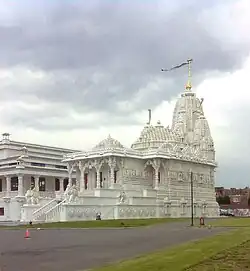 Jain temple in Laarstraat, Antwerp
Jain temple in Laarstraat, Antwerp Jain temple in Laarstraat, Antwerp
Jain temple in Laarstraat, Antwerp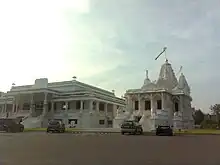 Jain temple in Laarstraat, Antwerp
Jain temple in Laarstraat, Antwerp Jain temple in Laarstraat, Antwerp
Jain temple in Laarstraat, Antwerp Jain temple in Laarstraat, Antwerp
Jain temple in Laarstraat, Antwerp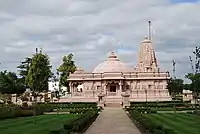 Jain Temple, Pottersbar, Hertfordshire
Jain Temple, Pottersbar, Hertfordshire Jain Centre in Oxford Street, Leicester
Jain Centre in Oxford Street, Leicester
References
Jainism A Way of Life by Vinod Kapashi
- "Jainism at a Glance". Jainstudy.org. Archived from the original on 27 February 2012. Retrieved 21 April 2012.
- "Religions - Jainism: Jainism at a glance". BBC. 27 August 2009. Retrieved 21 April 2012.
- Juergensmeyer, Mark (12 October 2006). The Oxford Handbook of Global Religions - Mark Juergensmeyer - Google Boeken. Oxford University Press. ISBN 9780199727612. Retrieved 21 April 2012.
- "An Introduction to Jainism: History, Religion, Gods, Scriptures and Beliefs". Kwintessential.co.uk. Archived from the original on 9 April 2016. Retrieved 21 April 2012.
- Kapur, Devesh (22 August 2010). Diaspora, Development, and Democracy: The Domestic Impact of International ... - Devesh Kapur - Google Books. ISBN 978-1400835089. Retrieved 21 April 2012.
- "Interdisciplinair Centrum Religiestudie & Interlevensbeschouwelijke Dialoog – Faculteit Theologie en religiewetenschappen KU Leuven" (in Dutch). Kuleuven.be. Retrieved 21 April 2012.
- "Presentation of the Belgian Council of Religious Leaders". Orthodox Archdiocese of Belgium and Exarchate of the Netherlands and Luxemburg. 17 December 2009. Archived from the original on 3 July 2011. Retrieved 11 September 2010.
- "Religions - Jainism: Jainism at a glance". BBC. Retrieved 14 September 2013.
- "on www.jainsamaj.org ( Jainism, Ahimsa News, Religion, Non-Violence, Culture, Vegetarianism, Meditation, India. )". Jainsamaj.org. Archived from the original on 18 September 2013. Retrieved 14 September 2013.
- The Jain Centre, Leicester. Retrieved 29 October 2008.
- Kurt Titze, Klaus Bruhn, Jainism: a pictorial guide to the religion of non-violence, p. 264
- "Abroad Centres - Shrimad Rajchandra Mission Dharampur". www.shrimadrajchandramission.org. Retrieved 5 May 2016.
- BARRISTER CHAMPAT RAI JAIN (1867 - 1942)
- "Microsoft Word - The Invention of Jainism _without photo_" (PDF). Retrieved 21 April 2012.
- Mehta, Dr. Manish. "Article Archive | 9th Jaina Studies Workshop - Jainism And Modernity - A Manish Mehta Report". Herenow4u.net. Retrieved 21 April 2012.
- "Jain Samaj Europe". Jaincentre.com. Retrieved 21 April 2012.
- Anupreksha Jain, Gnayak Jain, Samil Shah (webmaster), Nirav Gudhka (webmaster), Suchita Shah, Sheetal Shah. "Shree Digamber Jain Association". Sdja.co.uk. Retrieved 21 April 2012.
{{cite web}}: CS1 maint: multiple names: authors list (link) - Michael Lambek (2002). A Reader in the Anthropology of Religion. Wiley-Blackwell. ISBN 9780631221135. Retrieved 21 April 2012.
